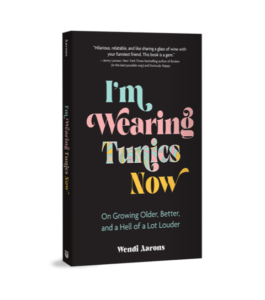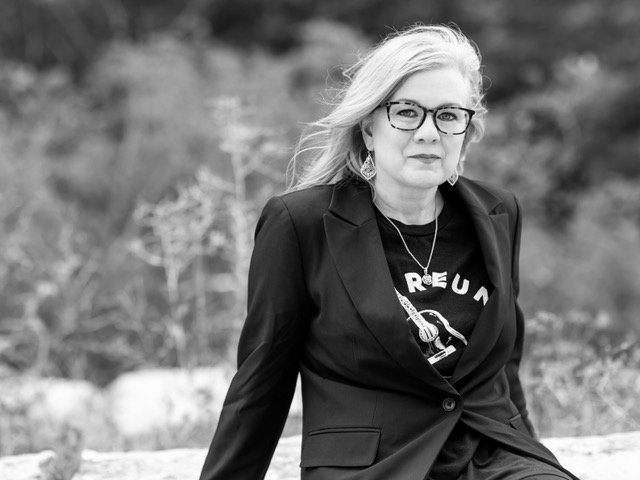Once you realize that you’ve reached “middle age,” you have a few choices – you can fight it, you can grudgingly come to terms with it, or you can find a way to accept it.
If you’re Wendi Aarons, you can embrace it, and even laugh about how you and your life have changed in ways you couldn’t imagine when you were younger. Aarons is an Austin-based humor writer, whose work has appeared in the New Yorker, McSweeney’s and US Weekly, among others. She’s also the author of a middle-school book called “Ginger Mancino, Kid Comedian.”
But Wendi Aarons’ latest book is more personal. It’s a memoir called, “I’m Wearing Tunics Now.” Aarons told Texas Standard that her acceptance of middle age began with clothing. Listen to the interview above or read the transcript below.
This transcript has been edited lightly for clarity:
Texas Standard: Well, tell us a little bit more about the tunics, please. What exactly was the inspiration for your title?
Wendi Aarons: I wanted to write a book about middle age and I just wanted it to be funny. I noticed that I had started to gravitate towards my mom’s section of Dillard’s and I was really interested in shirts that were at least 3 to 5 yards of fabric. And, you know, I realized that’s kind of a metaphor for just becoming more comfortable in your skin and wearing whatever you want to wear when you get to middle age and not trying to cram myself into the latest fashion or fads and, you know, just kind of draping myself in a tunic and going about my day – feeling comfortable, not caring what anybody else thought about it.

Courtesy of Wendi Aarons
Yeah. I also liked your well-placed Texas reference with the Dillard’s there. To say that you’ve embraced middle age is probably an understatement. I mean, is it liberating, that feeling that you’re describing there? Just “I just don’t really care that much about the fashion.” I mean, and to be able to write about it in a funny way, a lot of people have a little bit difficulty with that part of it.
Yeah, it’s so liberating. And I think, you know, there’s a little bit of a shame when you get to be over 40 and people ask you your age and you know, I grew up where women would always lie about their age and not want to say it. And I don’t understand why, because you really were so lucky just to be still around. And we have so much…
That’s harsh.
Well, we are. Well, I mean, like, I’m happy. Every day I wake up, I’m happy, you know, I’m here. And I say that, at this age, you have more road behind you than ahead of you. So there’s this impetus, at least there was, for me to make the most of it and just to approach it. And, you know, I know a lot about life at this age. I don’t know everything, but I know a lot. So why not just speak up and speak out? And if I see something I don’t like, I’m not going to be quiet about it anymore because the clock is ticking. And I don’t mean to sound fatalistic, but there’s no reason to hesitate to do what I want to anymore.
Yeah, well, I like that sense of liberation that you’re describing, albeit tinged with that fatalism. But that’s a big part of your entire approach with this book. I wonder why it is? I guess it’s that sense of mortality that makes people more reluctant not to embrace this stuff.
Yeah, I think so. And especially for women in the past few years, you know, my Generation X, we didn’t grow up with Girl Power or STEM or anything like that. So I kind of came to using my voice late in life. And there’s so much going on now in the world and in Texas that I would feel ridiculous if I didn’t speak out and use my voice and to stand up for what I believe in. Because I think the the situation is too fraught and dire to just be quiet anymore.
You were talking about what life is like in Texas. You moved here, what, in the late nineties? I heard you left L.A.?
Yes, we moved here in the late nineties. We didn’t know anybody. My husband once said, “I really like barbecue.” So we’re like, “okay, let’s go to Austin.” And I always say it was the dark days before we had a Nordstrom. It was just, you know, so much smaller and weirder. And, you know, easy living back then. And so we’ve been here for the bulk of all of the big changes to Austin. And I do miss old Austin, but I do appreciate all of the new personalities and energy that have come into the city.
You write about the difficulty, though, that you had feeling comfortable with “mom culture” after you and your husband made a life here. Could you say a little bit more about that?
Yeah, there’s a big change. I worked at Warner Bros., so there was a big change with dealing with movie producers and directors and then all of a sudden dealing with moms in a cul-de-sac who make you feel bad for not bringing organic food to the school lunch time. So it was a big switch. And in hindsight, I see that everybody was just anxious and trying to be the best mom they could, trying to be a great mom. At any time you have a group of parents like that together, there’s going to be drama and some of it’s silly. And, you know, I never clicked with anybody. I never found my person because it’s just a matter of luck. You just kind of had kids at the same time. You’re living in the same zip code. And so it’s a matter of chance if you’re going to find your best friend or not. And I didn’t.
But you did, sort of. I mean, did you not when you started to take up blogging a little bit later?
Yeah. So I pushed myself to get out of my comfort zone, out of my cul-de-sac, if you will. And I started to use my writing voice. I explored using humor to sort of put myself out into the world. And that led to my blog, and my blog led to meeting women all over the country. And then I started producing a show in Austin called “Listen to Your Mother.” And through that show, I met all these other great writers in Austin, and that just expanded my world and made me learn that it’s such a great idea to put yourself out there because you’re not going to make best friends just staying home or just, you know, dealing with the ones that happen to live next door to you.
You know, for all that, it can be scary – middle age and the changes that are coming. There’s a lot in this book that’s about the positive, or at the very least the funny, aspects of being a middle aged person and not just accepting it. But I get a sense that there’s a thriving impulse that you’re pointing to as well.
Yeah. One of my favorite sayings is “don’t get mad, get funny” and I use humor to navigate my life. And there’s so much inherent humor in the middle age. There’s a story in there of how I went to a furniture store in Austin and the two younger men helping me lift a coffee table got so distracted by a young pretty woman that they dropped it on my toe and didn’t even notice me screaming, you know? And I’m like, “What can I do?” I can cry about that. I can cry about them, you know, wanting to look at this pretty younger woman instead of me. But, you know, what’s the point? It’s better to laugh at it and then, you know, maybe consider a class action lawsuit about my injured toe.
But there’s also something about recognizing the humanity in so many of these situations and kind of taking a little bit of the sting out of it.
Yeah, taking the sting out of it. I have a chapter about trying to find a job when I was in my fifties and I interviewed at some companies in Austin and it was awkward for everybody involved because I probably seemed like more of their mother’s age and they seemed like my children’s age and not really coworker. And you go through the process and I could have been very depressed and sad about it. But again, I’m like, “I’m going to keep my sense of humor.” And yeah, this was weird and I’m going to acknowledge it. And, you know, I don’t want to go to ax throwing night with them. I don’t want to do all the things that 20-year-olds want to do in an office, and that’s okay. And again, it’s awkward for everybody, but you just have to acknowledge that. And, you know, you can be very funny, too.














